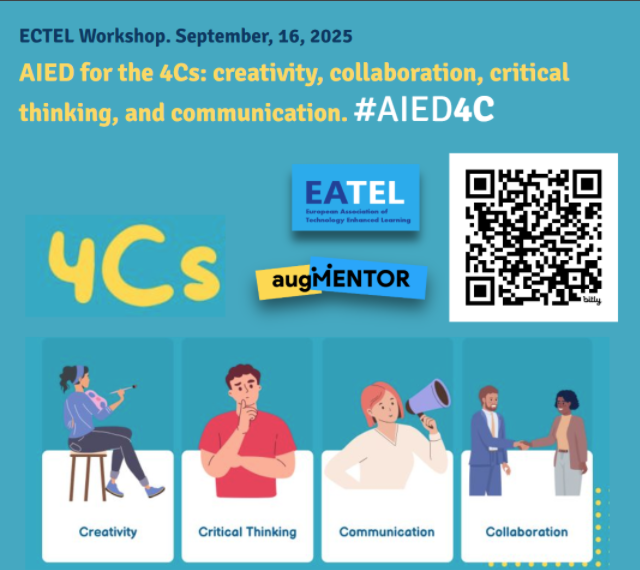|
|
|
|
AIED AIED4C Information at ECTEL 2025 Website : https://ea-tel.eu/ectel2025/ectel2025-workshops #AIED4C Workshop website : https://augmentor-ectel.github.io/index.html #AIED4C SciencesConf website : https://aied4c.sciencesconf.org/
While AI offers promising tools to scaffold and evaluate these complex skills, it also raises essential questions about learner agency, ethical design, and the transparency of automated assessments. Emerging research highlights both the opportunities and the limitations of using AI to foster the 4Cs across diverse learning contexts, from formal education to lifelong and professional learning. This full-day workshop invites researchers, practitioners, and designers to critically engage with how AI can be meaningfully integrated into learning activities to support the 4Cs. It will highlight theoretical foundations, present real-world case studies, and engage participants in co-design activities. The workshop is grounded in principles of hybrid intelligence, where human and artificial intelligence contributions are designed to complement each other for more inclusive, empowering learning experiences. The session is open to both experienced researchers in AIED and newcomers interested in learner-centered innovation.
Call for participationCall for Participants: ECTEL Workshop on AIED for the 4Cs 📢 Join us at ECTEL 2025 for a full-day workshop on "AIED for the 4Cs: creativity, collaboration, critical thinking, and communication"! As AI becomes more integrated into education, it's vital to explore how these technologies can support, not substitute, essential human competencies. This workshop invites researchers, practitioners, and designers to critically engage with how AI can enhance the development and assessment of the 4Cs. We will dive into: - Theoretical foundations and real-world case studies. - Co-design activities for AI-enhanced learning tasks. - Ethical, pedagogical, and technological considerations. - Learner and teacher agency in AI-supported environments. The workshop is grounded in principles of hybrid intelligence, aiming to create a collaborative space for building a new framework and network. More information : https://aied4c.sciencesconf.org/ Submissions before July, 30th, 2025⚠️ ➡️ We invite you to submit a presentation proposal for the workshop in the form of an extended abstract (up to 1000 words), including a title, a short abstract (maximum 150 words), and references.
Workshop Research Objectives
Expected Outcomes
ActivitiesWelcome & Framing Dialogue (30 minutes): Case Studies of AIED supporting the 4Cs (2 hours): Co-Design Session: Designing for the 4Cs with AI (1.5 hours): Ethics, Equity & Impact Dialogue (1 hour): Synthesis & Next Steps (30 minutes): Workshop Program CommitteeMargarida Romero Irene-Angelica Chounta
Andromachi Filippidi Bibeg Limbu
Alex Urmeneta Thomas Froesig
Horizon augMENTORThis workshop is organised as part of the Horizon augMENTOR project (GA No. 101061509).
|



